Assessment of Nursing Safety, Carer Information, and Confidentiality
VerifiedAdded on 2023/06/04
|7
|1994
|339
Essay
AI Summary
This essay explores two critical aspects of nursing practice: nurse safety and the ethical dilemma of providing information to carers while maintaining patient confidentiality. It addresses the various stressors affecting nurses' safety, such as long working hours and shift work, and suggests strategies to improve their well-being, including modified schedules and stress reduction techniques. Furthermore, it delves into the complexities of sharing patient information with carers, balancing the benefits of carer involvement with the legal and moral obligations of patient confidentiality. The essay discusses barriers to information sharing, such as lack of patient consent and inadequate training, and proposes solutions like proactive discussions with patients and the use of advanced directives. This student contributed document is available on Desklib, a platform offering a wealth of study resources for students.
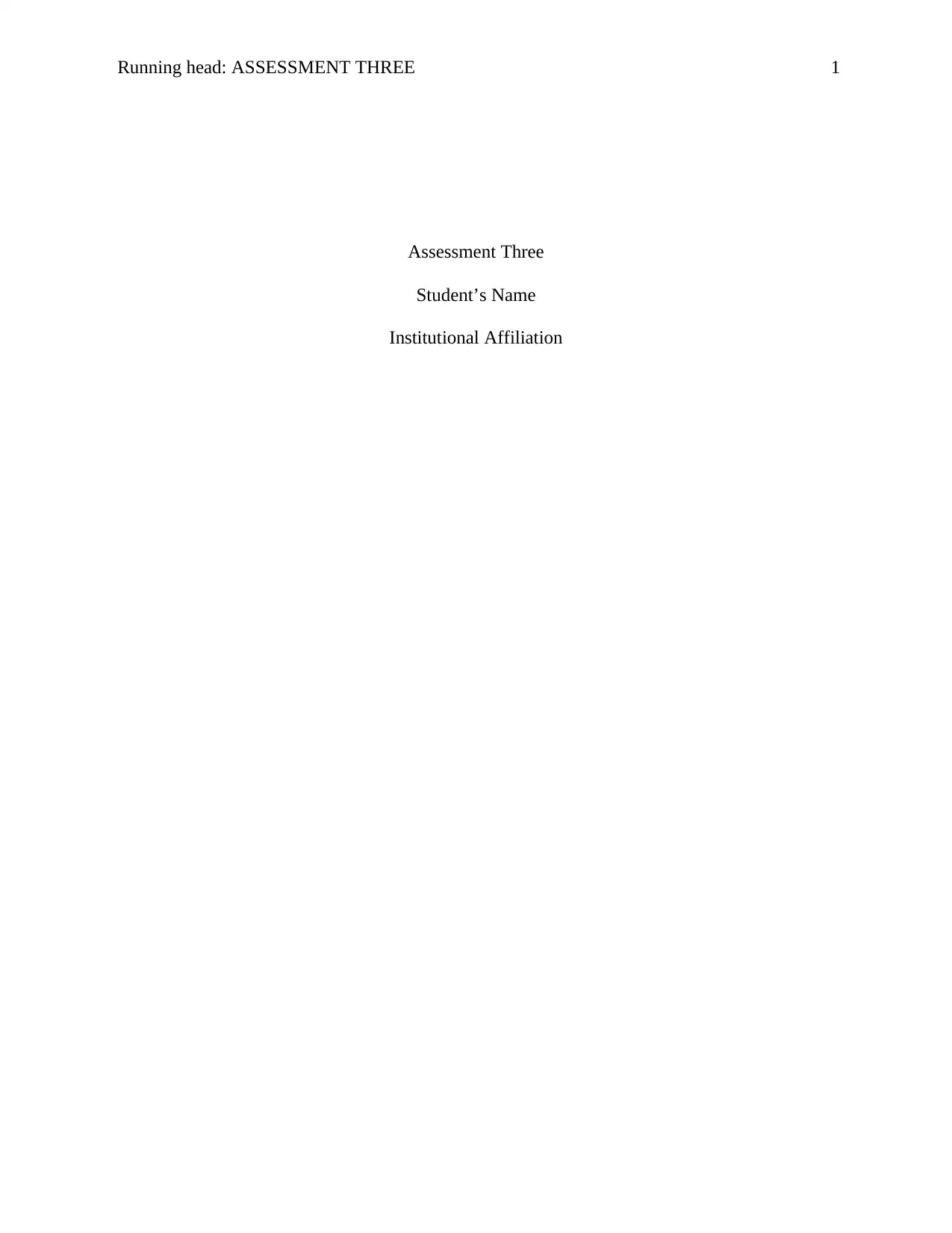
Running head: ASSESSMENT THREE 1
Assessment Three
Student’s Name
Institutional Affiliation
Assessment Three
Student’s Name
Institutional Affiliation
Paraphrase This Document
Need a fresh take? Get an instant paraphrase of this document with our AI Paraphraser
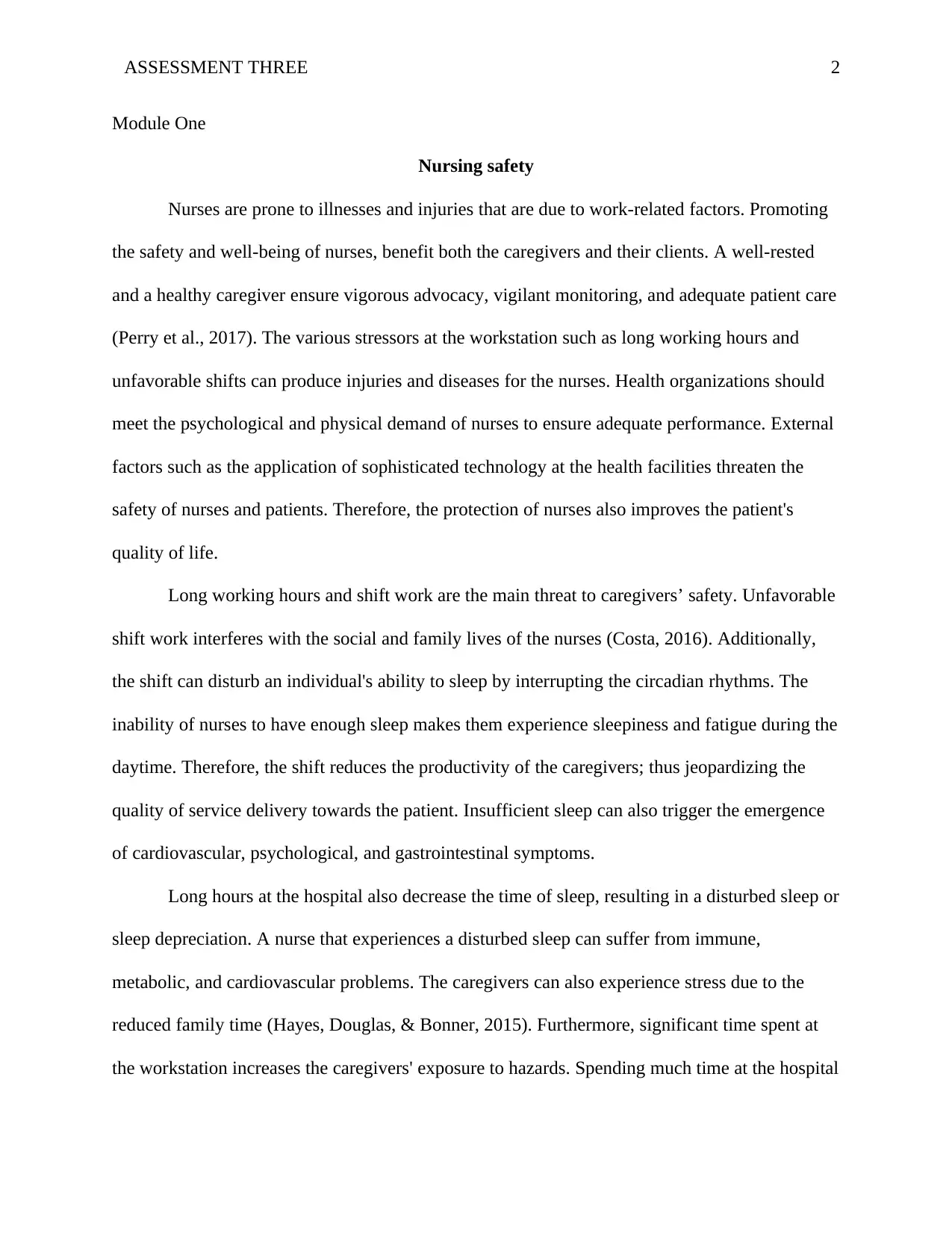
ASSESSMENT THREE 2
Module One
Nursing safety
Nurses are prone to illnesses and injuries that are due to work-related factors. Promoting
the safety and well-being of nurses, benefit both the caregivers and their clients. A well-rested
and a healthy caregiver ensure vigorous advocacy, vigilant monitoring, and adequate patient care
(Perry et al., 2017). The various stressors at the workstation such as long working hours and
unfavorable shifts can produce injuries and diseases for the nurses. Health organizations should
meet the psychological and physical demand of nurses to ensure adequate performance. External
factors such as the application of sophisticated technology at the health facilities threaten the
safety of nurses and patients. Therefore, the protection of nurses also improves the patient's
quality of life.
Long working hours and shift work are the main threat to caregivers’ safety. Unfavorable
shift work interferes with the social and family lives of the nurses (Costa, 2016). Additionally,
the shift can disturb an individual's ability to sleep by interrupting the circadian rhythms. The
inability of nurses to have enough sleep makes them experience sleepiness and fatigue during the
daytime. Therefore, the shift reduces the productivity of the caregivers; thus jeopardizing the
quality of service delivery towards the patient. Insufficient sleep can also trigger the emergence
of cardiovascular, psychological, and gastrointestinal symptoms.
Long hours at the hospital also decrease the time of sleep, resulting in a disturbed sleep or
sleep depreciation. A nurse that experiences a disturbed sleep can suffer from immune,
metabolic, and cardiovascular problems. The caregivers can also experience stress due to the
reduced family time (Hayes, Douglas, & Bonner, 2015). Furthermore, significant time spent at
the workstation increases the caregivers' exposure to hazards. Spending much time at the hospital
Module One
Nursing safety
Nurses are prone to illnesses and injuries that are due to work-related factors. Promoting
the safety and well-being of nurses, benefit both the caregivers and their clients. A well-rested
and a healthy caregiver ensure vigorous advocacy, vigilant monitoring, and adequate patient care
(Perry et al., 2017). The various stressors at the workstation such as long working hours and
unfavorable shifts can produce injuries and diseases for the nurses. Health organizations should
meet the psychological and physical demand of nurses to ensure adequate performance. External
factors such as the application of sophisticated technology at the health facilities threaten the
safety of nurses and patients. Therefore, the protection of nurses also improves the patient's
quality of life.
Long working hours and shift work are the main threat to caregivers’ safety. Unfavorable
shift work interferes with the social and family lives of the nurses (Costa, 2016). Additionally,
the shift can disturb an individual's ability to sleep by interrupting the circadian rhythms. The
inability of nurses to have enough sleep makes them experience sleepiness and fatigue during the
daytime. Therefore, the shift reduces the productivity of the caregivers; thus jeopardizing the
quality of service delivery towards the patient. Insufficient sleep can also trigger the emergence
of cardiovascular, psychological, and gastrointestinal symptoms.
Long hours at the hospital also decrease the time of sleep, resulting in a disturbed sleep or
sleep depreciation. A nurse that experiences a disturbed sleep can suffer from immune,
metabolic, and cardiovascular problems. The caregivers can also experience stress due to the
reduced family time (Hayes, Douglas, & Bonner, 2015). Furthermore, significant time spent at
the workstation increases the caregivers' exposure to hazards. Spending much time at the hospital
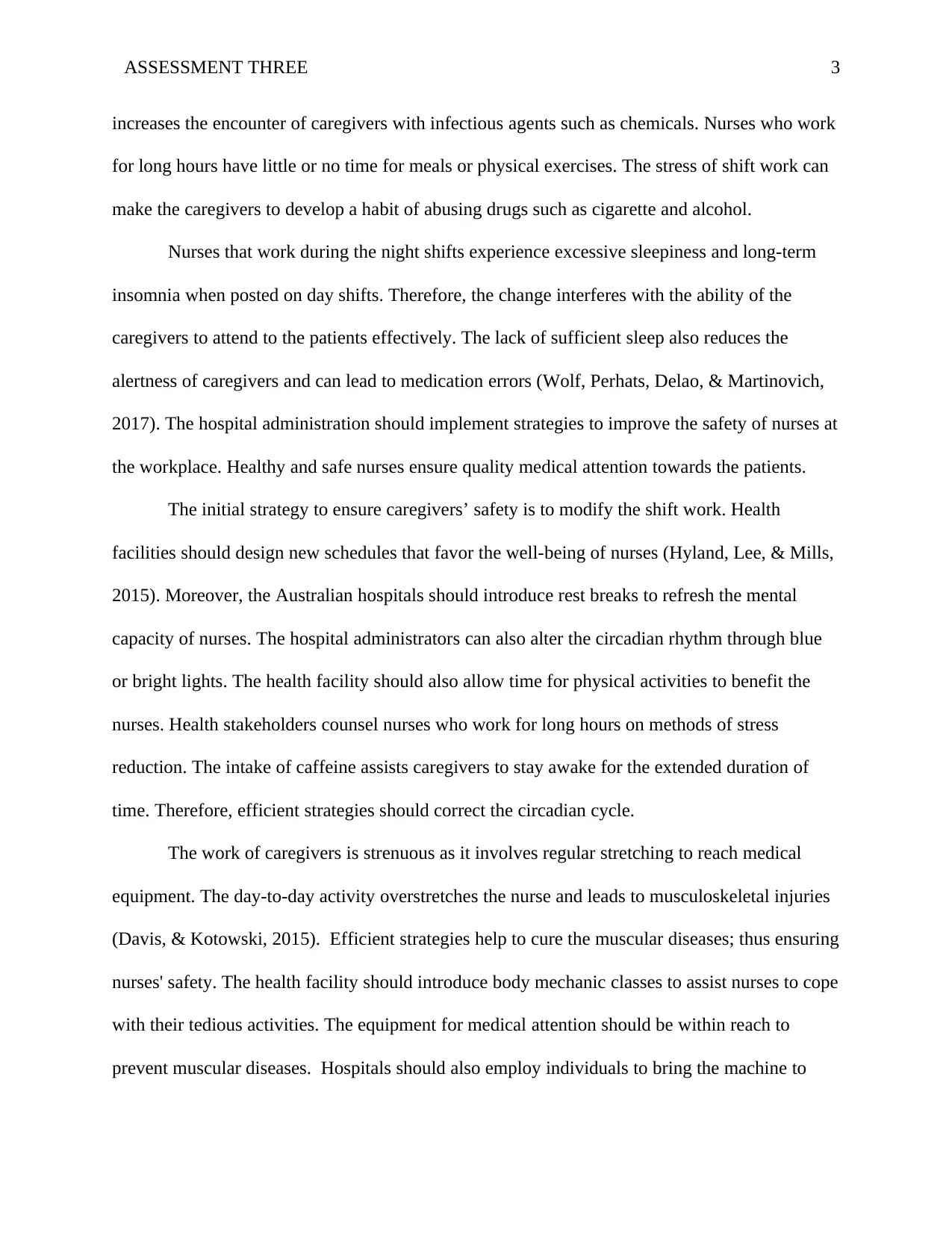
ASSESSMENT THREE 3
increases the encounter of caregivers with infectious agents such as chemicals. Nurses who work
for long hours have little or no time for meals or physical exercises. The stress of shift work can
make the caregivers to develop a habit of abusing drugs such as cigarette and alcohol.
Nurses that work during the night shifts experience excessive sleepiness and long-term
insomnia when posted on day shifts. Therefore, the change interferes with the ability of the
caregivers to attend to the patients effectively. The lack of sufficient sleep also reduces the
alertness of caregivers and can lead to medication errors (Wolf, Perhats, Delao, & Martinovich,
2017). The hospital administration should implement strategies to improve the safety of nurses at
the workplace. Healthy and safe nurses ensure quality medical attention towards the patients.
The initial strategy to ensure caregivers’ safety is to modify the shift work. Health
facilities should design new schedules that favor the well-being of nurses (Hyland, Lee, & Mills,
2015). Moreover, the Australian hospitals should introduce rest breaks to refresh the mental
capacity of nurses. The hospital administrators can also alter the circadian rhythm through blue
or bright lights. The health facility should also allow time for physical activities to benefit the
nurses. Health stakeholders counsel nurses who work for long hours on methods of stress
reduction. The intake of caffeine assists caregivers to stay awake for the extended duration of
time. Therefore, efficient strategies should correct the circadian cycle.
The work of caregivers is strenuous as it involves regular stretching to reach medical
equipment. The day-to-day activity overstretches the nurse and leads to musculoskeletal injuries
(Davis, & Kotowski, 2015). Efficient strategies help to cure the muscular diseases; thus ensuring
nurses' safety. The health facility should introduce body mechanic classes to assist nurses to cope
with their tedious activities. The equipment for medical attention should be within reach to
prevent muscular diseases. Hospitals should also employ individuals to bring the machine to
increases the encounter of caregivers with infectious agents such as chemicals. Nurses who work
for long hours have little or no time for meals or physical exercises. The stress of shift work can
make the caregivers to develop a habit of abusing drugs such as cigarette and alcohol.
Nurses that work during the night shifts experience excessive sleepiness and long-term
insomnia when posted on day shifts. Therefore, the change interferes with the ability of the
caregivers to attend to the patients effectively. The lack of sufficient sleep also reduces the
alertness of caregivers and can lead to medication errors (Wolf, Perhats, Delao, & Martinovich,
2017). The hospital administration should implement strategies to improve the safety of nurses at
the workplace. Healthy and safe nurses ensure quality medical attention towards the patients.
The initial strategy to ensure caregivers’ safety is to modify the shift work. Health
facilities should design new schedules that favor the well-being of nurses (Hyland, Lee, & Mills,
2015). Moreover, the Australian hospitals should introduce rest breaks to refresh the mental
capacity of nurses. The hospital administrators can also alter the circadian rhythm through blue
or bright lights. The health facility should also allow time for physical activities to benefit the
nurses. Health stakeholders counsel nurses who work for long hours on methods of stress
reduction. The intake of caffeine assists caregivers to stay awake for the extended duration of
time. Therefore, efficient strategies should correct the circadian cycle.
The work of caregivers is strenuous as it involves regular stretching to reach medical
equipment. The day-to-day activity overstretches the nurse and leads to musculoskeletal injuries
(Davis, & Kotowski, 2015). Efficient strategies help to cure the muscular diseases; thus ensuring
nurses' safety. The health facility should introduce body mechanic classes to assist nurses to cope
with their tedious activities. The equipment for medical attention should be within reach to
prevent muscular diseases. Hospitals should also employ individuals to bring the machine to
⊘ This is a preview!⊘
Do you want full access?
Subscribe today to unlock all pages.

Trusted by 1+ million students worldwide
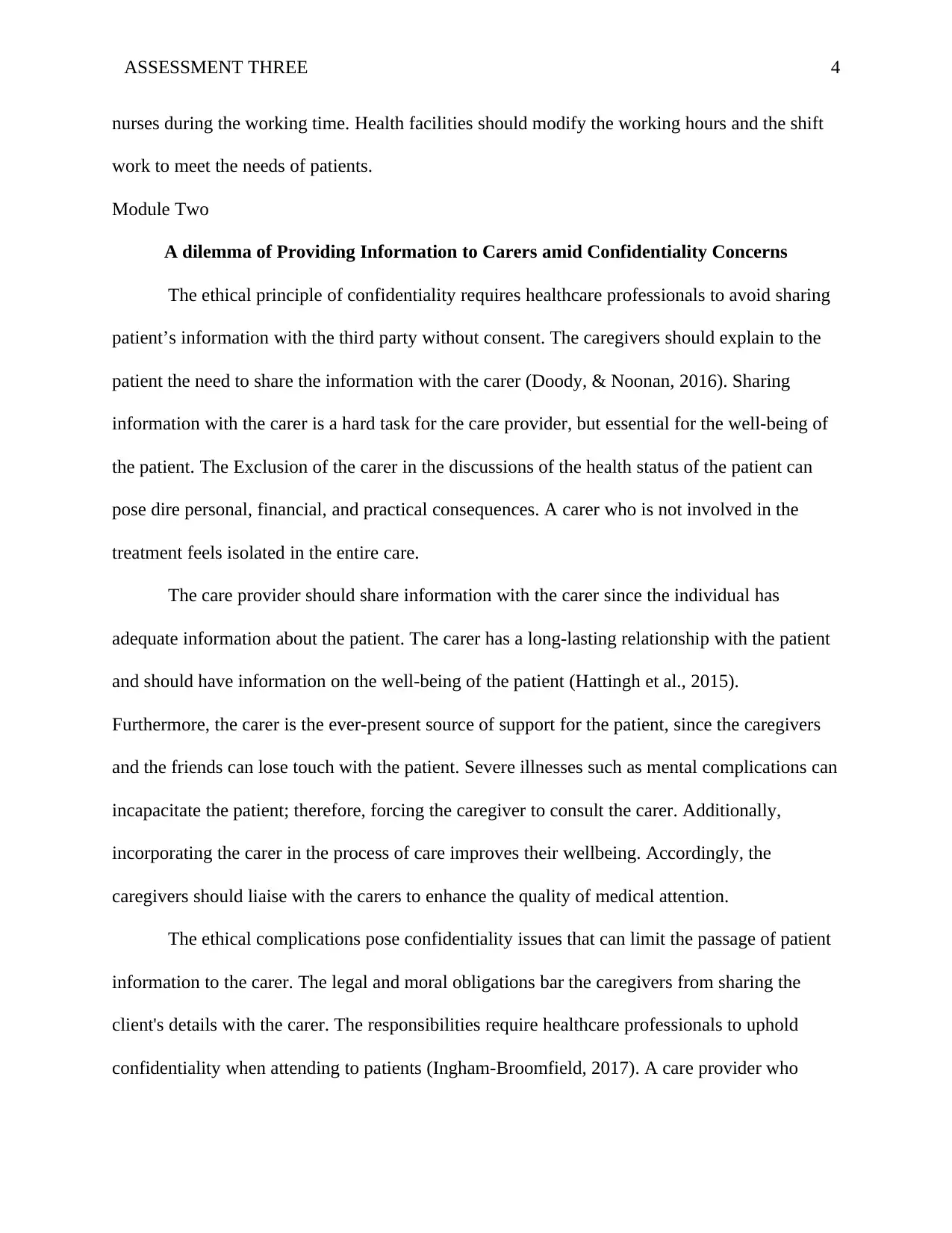
ASSESSMENT THREE 4
nurses during the working time. Health facilities should modify the working hours and the shift
work to meet the needs of patients.
Module Two
A dilemma of Providing Information to Carers amid Confidentiality Concerns
The ethical principle of confidentiality requires healthcare professionals to avoid sharing
patient’s information with the third party without consent. The caregivers should explain to the
patient the need to share the information with the carer (Doody, & Noonan, 2016). Sharing
information with the carer is a hard task for the care provider, but essential for the well-being of
the patient. The Exclusion of the carer in the discussions of the health status of the patient can
pose dire personal, financial, and practical consequences. A carer who is not involved in the
treatment feels isolated in the entire care.
The care provider should share information with the carer since the individual has
adequate information about the patient. The carer has a long-lasting relationship with the patient
and should have information on the well-being of the patient (Hattingh et al., 2015).
Furthermore, the carer is the ever-present source of support for the patient, since the caregivers
and the friends can lose touch with the patient. Severe illnesses such as mental complications can
incapacitate the patient; therefore, forcing the caregiver to consult the carer. Additionally,
incorporating the carer in the process of care improves their wellbeing. Accordingly, the
caregivers should liaise with the carers to enhance the quality of medical attention.
The ethical complications pose confidentiality issues that can limit the passage of patient
information to the carer. The legal and moral obligations bar the caregivers from sharing the
client's details with the carer. The responsibilities require healthcare professionals to uphold
confidentiality when attending to patients (Ingham-Broomfield, 2017). A care provider who
nurses during the working time. Health facilities should modify the working hours and the shift
work to meet the needs of patients.
Module Two
A dilemma of Providing Information to Carers amid Confidentiality Concerns
The ethical principle of confidentiality requires healthcare professionals to avoid sharing
patient’s information with the third party without consent. The caregivers should explain to the
patient the need to share the information with the carer (Doody, & Noonan, 2016). Sharing
information with the carer is a hard task for the care provider, but essential for the well-being of
the patient. The Exclusion of the carer in the discussions of the health status of the patient can
pose dire personal, financial, and practical consequences. A carer who is not involved in the
treatment feels isolated in the entire care.
The care provider should share information with the carer since the individual has
adequate information about the patient. The carer has a long-lasting relationship with the patient
and should have information on the well-being of the patient (Hattingh et al., 2015).
Furthermore, the carer is the ever-present source of support for the patient, since the caregivers
and the friends can lose touch with the patient. Severe illnesses such as mental complications can
incapacitate the patient; therefore, forcing the caregiver to consult the carer. Additionally,
incorporating the carer in the process of care improves their wellbeing. Accordingly, the
caregivers should liaise with the carers to enhance the quality of medical attention.
The ethical complications pose confidentiality issues that can limit the passage of patient
information to the carer. The legal and moral obligations bar the caregivers from sharing the
client's details with the carer. The responsibilities require healthcare professionals to uphold
confidentiality when attending to patients (Ingham-Broomfield, 2017). A care provider who
Paraphrase This Document
Need a fresh take? Get an instant paraphrase of this document with our AI Paraphraser
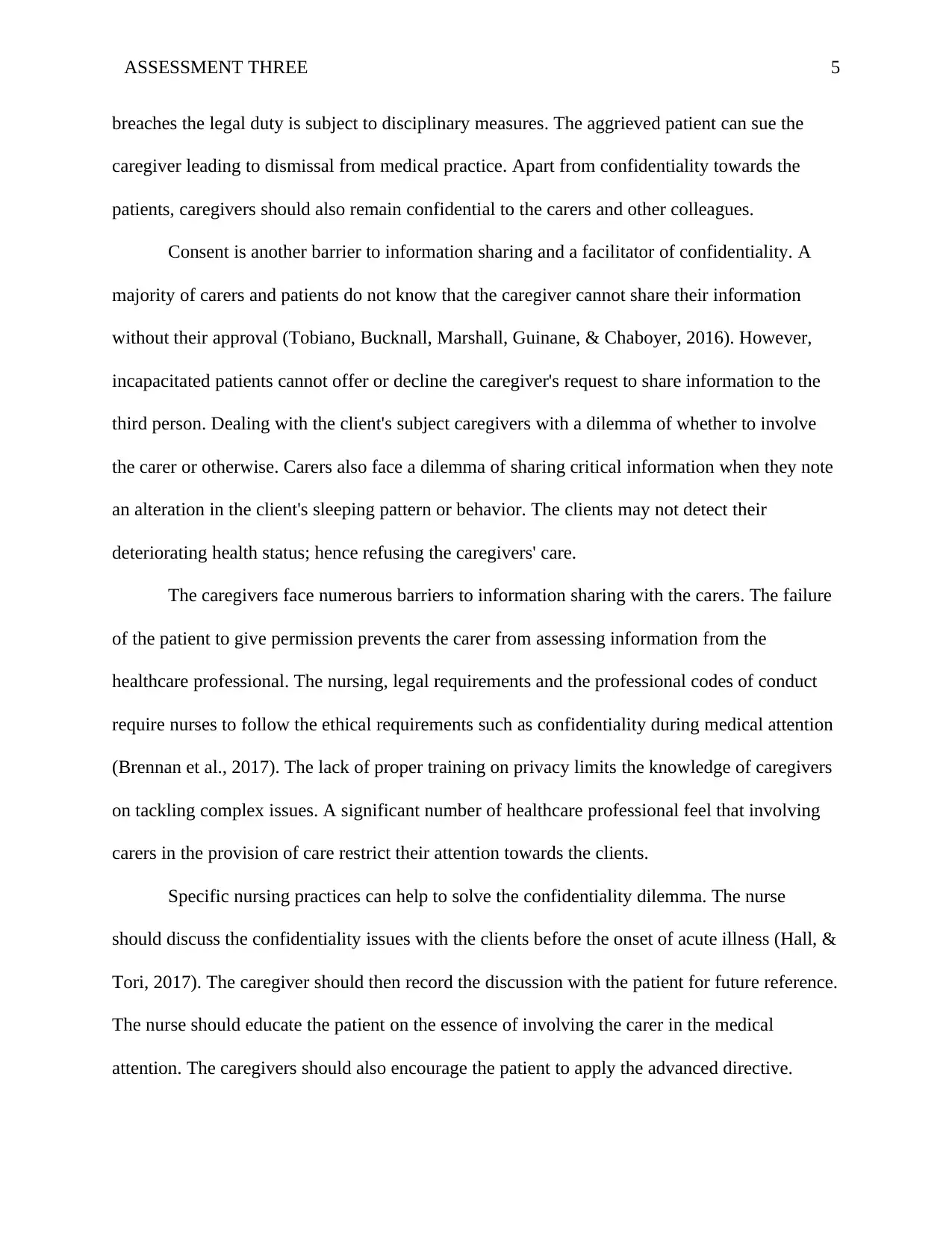
ASSESSMENT THREE 5
breaches the legal duty is subject to disciplinary measures. The aggrieved patient can sue the
caregiver leading to dismissal from medical practice. Apart from confidentiality towards the
patients, caregivers should also remain confidential to the carers and other colleagues.
Consent is another barrier to information sharing and a facilitator of confidentiality. A
majority of carers and patients do not know that the caregiver cannot share their information
without their approval (Tobiano, Bucknall, Marshall, Guinane, & Chaboyer, 2016). However,
incapacitated patients cannot offer or decline the caregiver's request to share information to the
third person. Dealing with the client's subject caregivers with a dilemma of whether to involve
the carer or otherwise. Carers also face a dilemma of sharing critical information when they note
an alteration in the client's sleeping pattern or behavior. The clients may not detect their
deteriorating health status; hence refusing the caregivers' care.
The caregivers face numerous barriers to information sharing with the carers. The failure
of the patient to give permission prevents the carer from assessing information from the
healthcare professional. The nursing, legal requirements and the professional codes of conduct
require nurses to follow the ethical requirements such as confidentiality during medical attention
(Brennan et al., 2017). The lack of proper training on privacy limits the knowledge of caregivers
on tackling complex issues. A significant number of healthcare professional feel that involving
carers in the provision of care restrict their attention towards the clients.
Specific nursing practices can help to solve the confidentiality dilemma. The nurse
should discuss the confidentiality issues with the clients before the onset of acute illness (Hall, &
Tori, 2017). The caregiver should then record the discussion with the patient for future reference.
The nurse should educate the patient on the essence of involving the carer in the medical
attention. The caregivers should also encourage the patient to apply the advanced directive.
breaches the legal duty is subject to disciplinary measures. The aggrieved patient can sue the
caregiver leading to dismissal from medical practice. Apart from confidentiality towards the
patients, caregivers should also remain confidential to the carers and other colleagues.
Consent is another barrier to information sharing and a facilitator of confidentiality. A
majority of carers and patients do not know that the caregiver cannot share their information
without their approval (Tobiano, Bucknall, Marshall, Guinane, & Chaboyer, 2016). However,
incapacitated patients cannot offer or decline the caregiver's request to share information to the
third person. Dealing with the client's subject caregivers with a dilemma of whether to involve
the carer or otherwise. Carers also face a dilemma of sharing critical information when they note
an alteration in the client's sleeping pattern or behavior. The clients may not detect their
deteriorating health status; hence refusing the caregivers' care.
The caregivers face numerous barriers to information sharing with the carers. The failure
of the patient to give permission prevents the carer from assessing information from the
healthcare professional. The nursing, legal requirements and the professional codes of conduct
require nurses to follow the ethical requirements such as confidentiality during medical attention
(Brennan et al., 2017). The lack of proper training on privacy limits the knowledge of caregivers
on tackling complex issues. A significant number of healthcare professional feel that involving
carers in the provision of care restrict their attention towards the clients.
Specific nursing practices can help to solve the confidentiality dilemma. The nurse
should discuss the confidentiality issues with the clients before the onset of acute illness (Hall, &
Tori, 2017). The caregiver should then record the discussion with the patient for future reference.
The nurse should educate the patient on the essence of involving the carer in the medical
attention. The caregivers should also encourage the patient to apply the advanced directive.
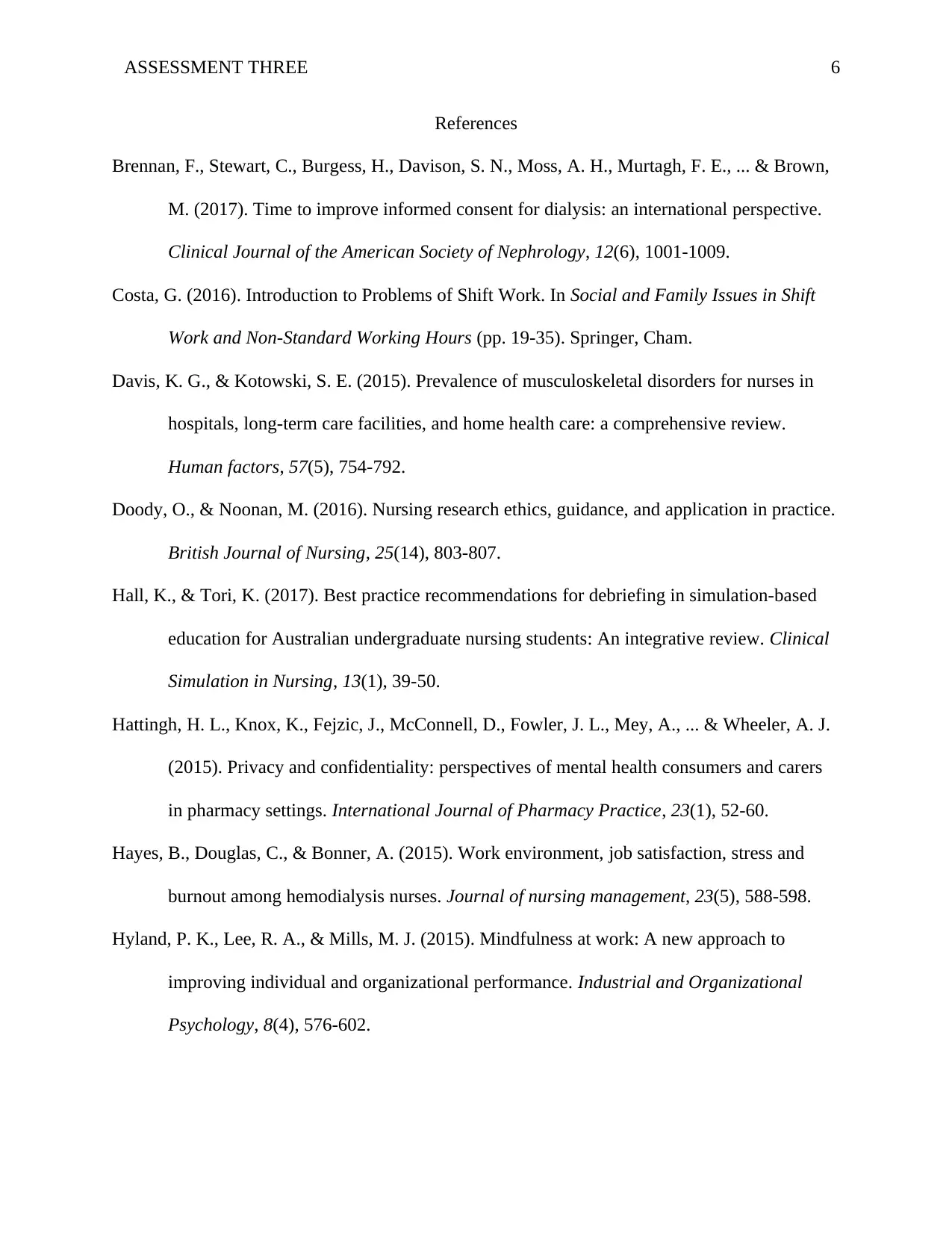
ASSESSMENT THREE 6
References
Brennan, F., Stewart, C., Burgess, H., Davison, S. N., Moss, A. H., Murtagh, F. E., ... & Brown,
M. (2017). Time to improve informed consent for dialysis: an international perspective.
Clinical Journal of the American Society of Nephrology, 12(6), 1001-1009.
Costa, G. (2016). Introduction to Problems of Shift Work. In Social and Family Issues in Shift
Work and Non-Standard Working Hours (pp. 19-35). Springer, Cham.
Davis, K. G., & Kotowski, S. E. (2015). Prevalence of musculoskeletal disorders for nurses in
hospitals, long-term care facilities, and home health care: a comprehensive review.
Human factors, 57(5), 754-792.
Doody, O., & Noonan, M. (2016). Nursing research ethics, guidance, and application in practice.
British Journal of Nursing, 25(14), 803-807.
Hall, K., & Tori, K. (2017). Best practice recommendations for debriefing in simulation-based
education for Australian undergraduate nursing students: An integrative review. Clinical
Simulation in Nursing, 13(1), 39-50.
Hattingh, H. L., Knox, K., Fejzic, J., McConnell, D., Fowler, J. L., Mey, A., ... & Wheeler, A. J.
(2015). Privacy and confidentiality: perspectives of mental health consumers and carers
in pharmacy settings. International Journal of Pharmacy Practice, 23(1), 52-60.
Hayes, B., Douglas, C., & Bonner, A. (2015). Work environment, job satisfaction, stress and
burnout among hemodialysis nurses. Journal of nursing management, 23(5), 588-598.
Hyland, P. K., Lee, R. A., & Mills, M. J. (2015). Mindfulness at work: A new approach to
improving individual and organizational performance. Industrial and Organizational
Psychology, 8(4), 576-602.
References
Brennan, F., Stewart, C., Burgess, H., Davison, S. N., Moss, A. H., Murtagh, F. E., ... & Brown,
M. (2017). Time to improve informed consent for dialysis: an international perspective.
Clinical Journal of the American Society of Nephrology, 12(6), 1001-1009.
Costa, G. (2016). Introduction to Problems of Shift Work. In Social and Family Issues in Shift
Work and Non-Standard Working Hours (pp. 19-35). Springer, Cham.
Davis, K. G., & Kotowski, S. E. (2015). Prevalence of musculoskeletal disorders for nurses in
hospitals, long-term care facilities, and home health care: a comprehensive review.
Human factors, 57(5), 754-792.
Doody, O., & Noonan, M. (2016). Nursing research ethics, guidance, and application in practice.
British Journal of Nursing, 25(14), 803-807.
Hall, K., & Tori, K. (2017). Best practice recommendations for debriefing in simulation-based
education for Australian undergraduate nursing students: An integrative review. Clinical
Simulation in Nursing, 13(1), 39-50.
Hattingh, H. L., Knox, K., Fejzic, J., McConnell, D., Fowler, J. L., Mey, A., ... & Wheeler, A. J.
(2015). Privacy and confidentiality: perspectives of mental health consumers and carers
in pharmacy settings. International Journal of Pharmacy Practice, 23(1), 52-60.
Hayes, B., Douglas, C., & Bonner, A. (2015). Work environment, job satisfaction, stress and
burnout among hemodialysis nurses. Journal of nursing management, 23(5), 588-598.
Hyland, P. K., Lee, R. A., & Mills, M. J. (2015). Mindfulness at work: A new approach to
improving individual and organizational performance. Industrial and Organizational
Psychology, 8(4), 576-602.
⊘ This is a preview!⊘
Do you want full access?
Subscribe today to unlock all pages.

Trusted by 1+ million students worldwide
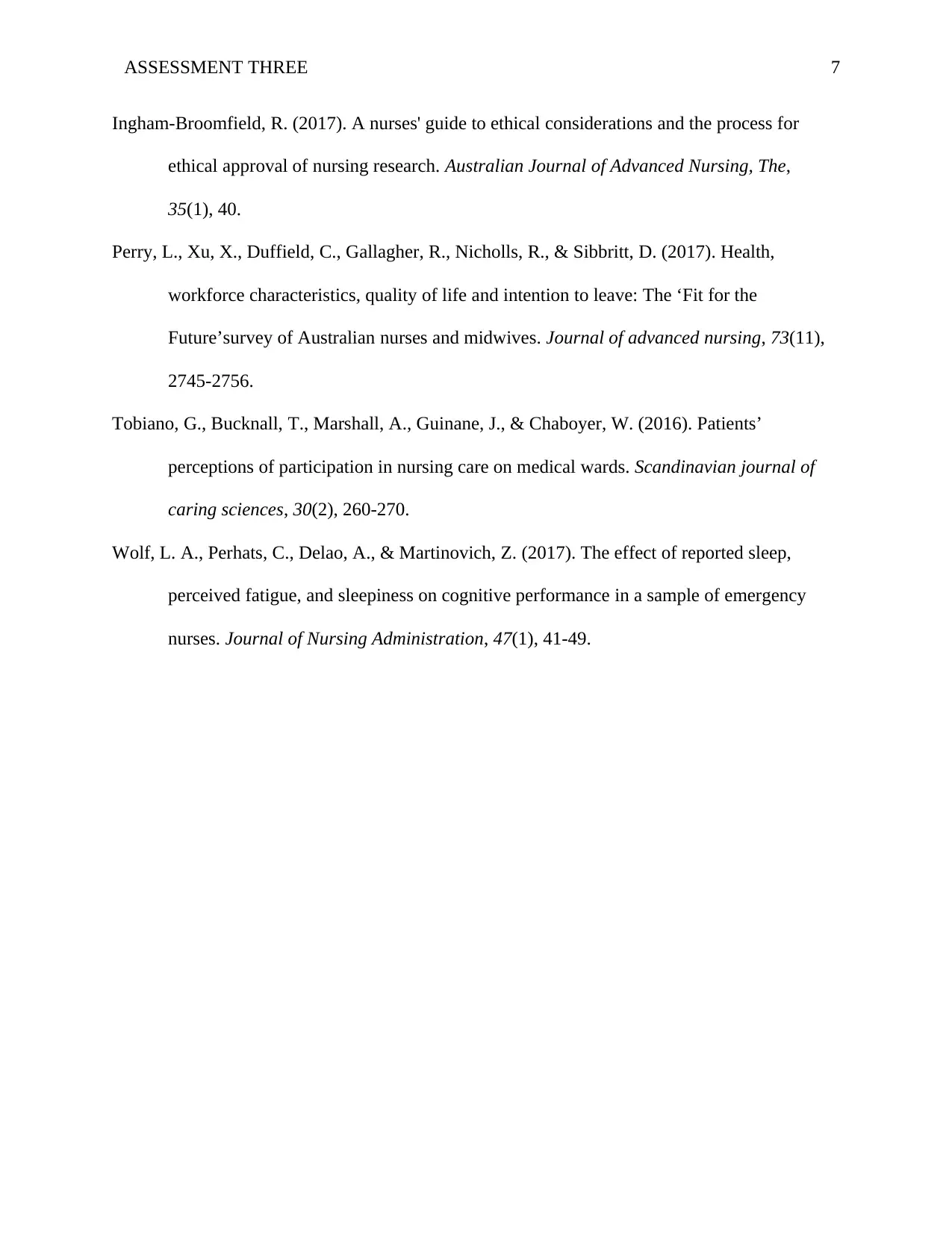
ASSESSMENT THREE 7
Ingham-Broomfield, R. (2017). A nurses' guide to ethical considerations and the process for
ethical approval of nursing research. Australian Journal of Advanced Nursing, The,
35(1), 40.
Perry, L., Xu, X., Duffield, C., Gallagher, R., Nicholls, R., & Sibbritt, D. (2017). Health,
workforce characteristics, quality of life and intention to leave: The ‘Fit for the
Future’survey of Australian nurses and midwives. Journal of advanced nursing, 73(11),
2745-2756.
Tobiano, G., Bucknall, T., Marshall, A., Guinane, J., & Chaboyer, W. (2016). Patients’
perceptions of participation in nursing care on medical wards. Scandinavian journal of
caring sciences, 30(2), 260-270.
Wolf, L. A., Perhats, C., Delao, A., & Martinovich, Z. (2017). The effect of reported sleep,
perceived fatigue, and sleepiness on cognitive performance in a sample of emergency
nurses. Journal of Nursing Administration, 47(1), 41-49.
Ingham-Broomfield, R. (2017). A nurses' guide to ethical considerations and the process for
ethical approval of nursing research. Australian Journal of Advanced Nursing, The,
35(1), 40.
Perry, L., Xu, X., Duffield, C., Gallagher, R., Nicholls, R., & Sibbritt, D. (2017). Health,
workforce characteristics, quality of life and intention to leave: The ‘Fit for the
Future’survey of Australian nurses and midwives. Journal of advanced nursing, 73(11),
2745-2756.
Tobiano, G., Bucknall, T., Marshall, A., Guinane, J., & Chaboyer, W. (2016). Patients’
perceptions of participation in nursing care on medical wards. Scandinavian journal of
caring sciences, 30(2), 260-270.
Wolf, L. A., Perhats, C., Delao, A., & Martinovich, Z. (2017). The effect of reported sleep,
perceived fatigue, and sleepiness on cognitive performance in a sample of emergency
nurses. Journal of Nursing Administration, 47(1), 41-49.
1 out of 7